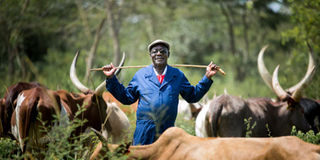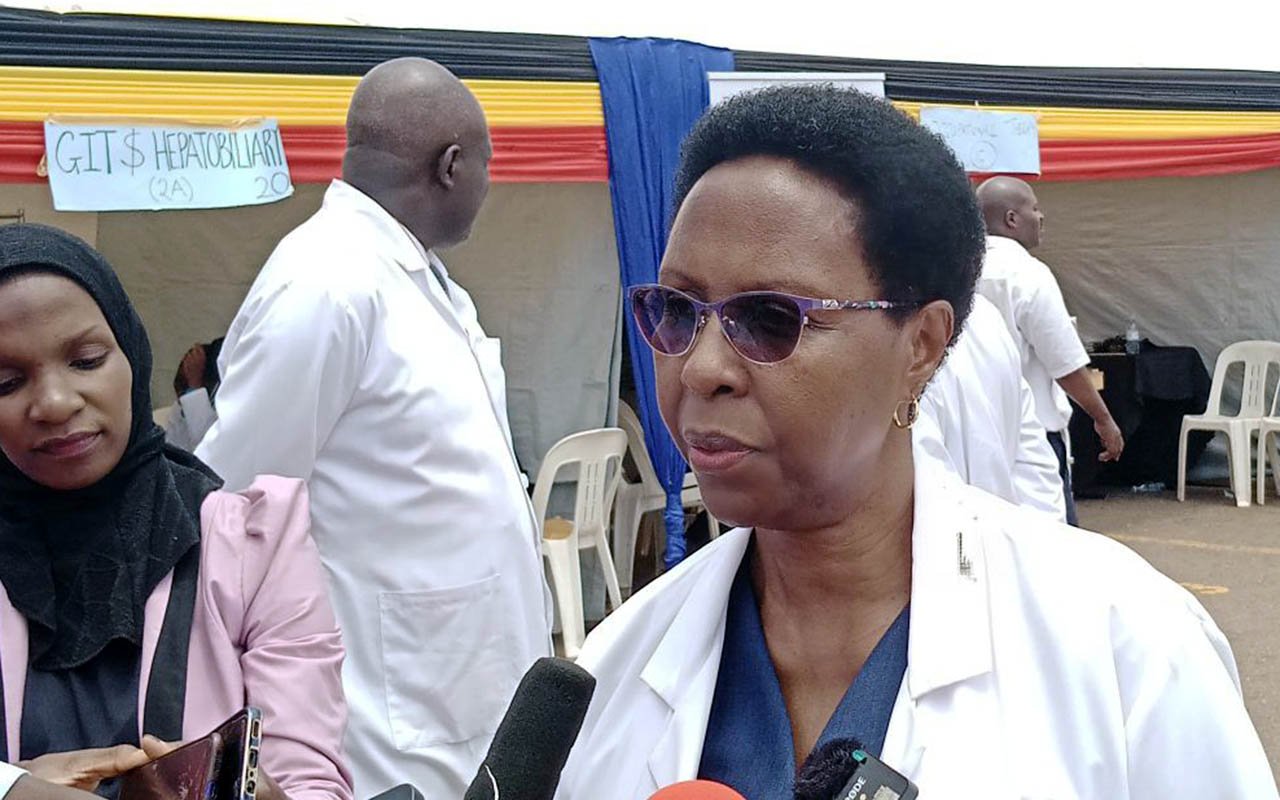Meet the engineer hoping to build an agribusiness empire

Mr James Ajal attends to his cows. PHOTO BY ERONIE KAMUKAMA
What you need to know:
Mr James Ajal added 165 acres of land and fenced the entire farm, summing the total acreage to 185. But he wondered what he could do with all his land. At the time, there was a big campaign about a new fruit factory in Soroti. Mr Ajal explains that the factory would need constant supply of citrus fruits such as oranges and tangerines. Writes Eronie Kamukama.
Mr James Ajal bought 20 acres of land in Igoti village, in the northern district of Apac, almost 12 years ago.
After about more than 40 years in the electricity distribution sector, he hoped that he could lead an active life even after hitting retirement age. He also hoped he could make money to pay his medical bills as he had grown older.
“My worry was so what when salary stops,” he says. So Mr Ajal set up a cattle farm.
“I moved my 17 cows from the village and put them in this kraal. I bought seven in calves and another three which were breastfeeding. I also bought a few young bulls which I grew and later sold at about Shs30m,” he says.
Next to the farm was another chunk of land. Mr Ajal added 165 acres of land and fenced the entire farm, summing the total acreage to 185. But he wondered what he could do with all his land. At the time, there was a big campaign about a new fruit factory in Soroti District. Mr Ajal explains that the factory would need constant supply of citrus fruits such as oranges and tangerines.
His fruit farming journey began once he bought 2000 cloned orange trees from a seedling supplier in Soroti district. While most farmers wait on the rains, Mr Ajal’s plan was to use drip irrigation to supplement them. The big challenge came when he lost many of the trees to the dry season because he was using mineral water bottles to irrigate.
After months of trekking with the animals to and watering the trees from River Nile that was three kilometres away from the farm, he sank a borehole 53 metres into the earth.
“When we sank the borehole, we used a hand pump. Afterwards, I decided to modernise it. I bought a digital pump and wired the whole garden with pipes. The total litreage of the tank is 20,000. Each hour we pump 5000 litres,” he explains. The same piping system extended to the drinking troughs for the animals that drink four times a day.
Besides grappling with disease control and animal theft, the other challenge on the farm was that as the oranges grew, labourers became scarce, sending him as far as Teso sub-region to find workers.
Meanwhile, as the farm business boomed, people along the main road in Igoti village had land to sell. Mr Ajal purchased 38 acres of land and planted trees on 32 acres, 10,000 of which are cloned eucalyptus trees that mature in five years.
“We have spaced them 3 by 3, which means I expect timber from them,” he says. “5000 trees there are pine that mature in about 15 years. We have an extra six acres we are using for food production.”
Starting a ginger farm
At the far end of Mr Ajal’s orange farm is a ginger garden he set up after information indicated that ginger was one of the sought-after crops.
Initially, he dug 11,000 holes of ginger and planted four kilogrammes in each. With each kilogramme purchased at Shs8,000, he has planted 526 holes of ginger. He is yet to export and supply ginger to local fruits factories.
Today, since his irrigations plans took effect, Mr Ajal boasts of healthier and fast-growing animals. Every year, 25 calves are added onto his herd. His highest number of animals has been 100, a number he has managed to keep low by selling all fat bulls mid-year in abattoirs such as Kalerwe in Kampala. Since the business is growing, he ploughs the money back in.
On the ground, the trees are slowly growing. “The first group is being harvested. We are picking five to 10 bags every week but it is useless because there is no market. Oranges are everywhere, we anticipated we would be supplying the factory but it has not worked,” he says. He does not disclose his earnings but believes he hardly has reasonable sales.
But did he get all this wealth from Shs59m he received as age benefits from at National Social Security Fund (NSSF)? “No,” he responds.
“The first land I bought was Shs11m, I bought cows worth Shs20m and the kraal came to Shs1m. The other I used to buy the extension of the land though I topped up.”
Although he hardly knew what to do with his National Social Security Benefits in 2006, his NSSF benefits have multiplied to bring a beacon of hope to his community.
Some of his neighbours are beneficiaries of the operation wealth creation programme and received orange seedlings. He now hopes to cooperate with them to easily access a bigger market.
“Oranges are rotting in Lango. We have initiated another programme of putting electricity to make a mini juice factory by mid this year to take care of this market story and support the local people with purchase of their oranges,” he says.
As a result, the electricity should be able to reduce costs on irrigation.
“We are using a diesel engine pump and a petrol engine as a rain gun. So we can use it to power this. Because the ginger is too much, we may have to dry it so we are thinking of a solar drier to sell it to the market,” he added.
More future investment plans
The engineering consultant has many plans and should he win the Shs30m from NSSF Friends with Benefits competition, he wants to expand the animals, separate the dairy cattle from beef cattle and introduce an oil producing crop on the farm.
“I see a business empire handling fruit juice processing, supplying milk massively, beef to meat factories and selling timber from the seven blocks of trees which are ready for harvest,” he says.
Success tips
Do your homework well. Do feasibility study and make sure the population can sustain the business.
Do not be too cheap or too expensive.
Be professional.
To vote for James Ajal in the NSSF Friends with Benefits completion, dial *254# or go to www.nssfug.org/fwb




